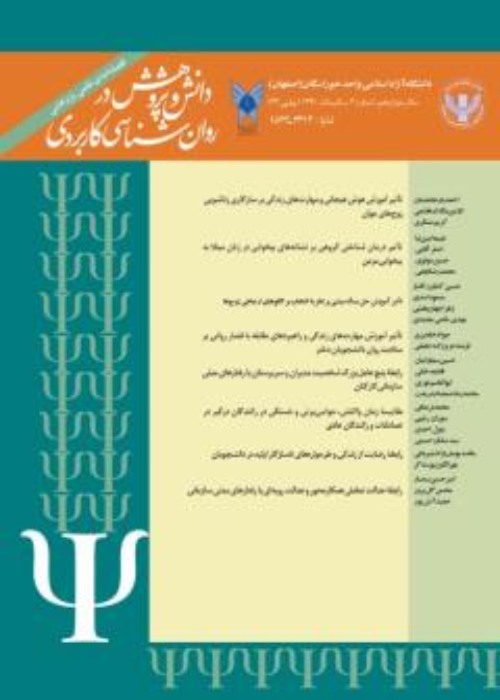A comparison of the effectiveness of cognitive-behavioral couple therapy and acceptance and commitment couple therapy on conflicting couple's marital intimacy in the city of Isfahan
Author(s):
Abstract:
The purpose of the present study was to compare the effectiveness of cognitive-behavioral couple therapy (CBCT) and acceptance and commitment couple therapy on conflicting couples marital intimacy in the city of Isfahan. A semi-experimental design with pretest, posttest and control group was used. The statistical population included all conflicting couples referring to consultation centers in the city of Isfahan. The sampling method was in voluntary form. 90 individuals (couples) were put into three groups of cognitive-behavioral couple therapy (30 individuals), acceptance and commitment couple therapy (30 individuals) and the control group (30 individuals). Both two experimental groups received 12 ninety-minute sessions of therapy once a week. The study instrument was Oliya et.al.s (2009) questionnaire of couples intimacy. covariance analysis method was used to analyze the data via SPSS software. The results revealed that cognitive-behavioral couple therapy and acceptance and commitment couple therapy made significant changes in the marital intimacy at the posttest stage (P0.05). According to the results of the study, cognitive-behavioral couple therapy and acceptance and commitment couple therapy made significant changes in marital intimacy and there was no significant difference between the effectiveness of these two therapeutic methods. The results of this study provide experimental support for both therapies in order to increase marital intimacy.
Keywords:
Language:
Persian
Published:
Knowledge & Research in Applied Psychology, Volume:17 Issue: 66, 2017
Pages:
31 to 40
magiran.com/p1703584
دانلود و مطالعه متن این مقاله با یکی از روشهای زیر امکان پذیر است:
اشتراک شخصی
با عضویت و پرداخت آنلاین حق اشتراک یکساله به مبلغ 1,390,000ريال میتوانید 70 عنوان مطلب دانلود کنید!
اشتراک سازمانی
به کتابخانه دانشگاه یا محل کار خود پیشنهاد کنید تا اشتراک سازمانی این پایگاه را برای دسترسی نامحدود همه کاربران به متن مطالب تهیه نمایند!
توجه!
- حق عضویت دریافتی صرف حمایت از نشریات عضو و نگهداری، تکمیل و توسعه مگیران میشود.
- پرداخت حق اشتراک و دانلود مقالات اجازه بازنشر آن در سایر رسانههای چاپی و دیجیتال را به کاربر نمیدهد.
In order to view content subscription is required
Personal subscription
Subscribe magiran.com for 70 € euros via PayPal and download 70 articles during a year.
Organization subscription
Please contact us to subscribe your university or library for unlimited access!



